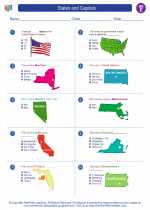American Civil War
The American Civil War was a major conflict fought in the United States from 1861 to 1865. It was a war between the Northern states (Union) and the Southern states (Confederacy) over issues such as slavery, states' rights, and the power of the federal government. The war had a profound impact on the country and led to significant social, economic, and political changes.
Causes of the Civil War
The main causes of the Civil War included:
- Slavery: The issue of slavery was a major point of contention between the Northern and Southern states. The Southern states relied heavily on slave labor for their agricultural economy, while the Northern states opposed the expansion of slavery into new territories.
- States' Rights: Southern states believed in the sovereignty of individual states and their right to govern themselves, while the Northern states emphasized the authority of the federal government.
- Economic Differences: The Northern states were industrialized, while the Southern states were agrarian. This economic contrast contributed to the differing viewpoints and interests of the two regions.
Key Events and Battles
Some of the key events and battles during the Civil War include:
- Fort Sumter: The war began with the Confederate attack on Fort Sumter in South Carolina in April 1861.
- Gettysburg: The Battle of Gettysburg in 1863 was a turning point in the war and is considered one of the most significant battles fought on American soil.
- Emancipation Proclamation: In 1863, President Abraham Lincoln issued the Emancipation Proclamation, declaring that all enslaved people in the Confederate states were to be set free.
- Appomattox Court House: The war effectively ended with the surrender of the Confederate army to Union forces at Appomattox Court House in 1865.
Impact and Aftermath
The Civil War had a lasting impact on the United States, including:
- Abolition of Slavery: The war led to the abolition of slavery with the passage of the 13th Amendment to the Constitution.
- National Unity: The Union victory reinforced the authority of the federal government and strengthened the concept of national unity.
- Economic Changes: The war brought significant economic changes, including the expansion of industrialization and the modernization of the American economy.
Study Guide
To study the American Civil War, consider focusing on the following key points:
- Causes of the Civil War, including slavery, states' rights, and economic differences.
- Key events and battles, such as Fort Sumter, Gettysburg, the Emancipation Proclamation, and Appomattox Court House.
- The impact and aftermath of the war, including the abolition of slavery, national unity, and economic changes.
- Key figures and leaders of the Civil War, including Abraham Lincoln, Jefferson Davis, Ulysses S. Grant, and Robert E. Lee.
Understanding these aspects of the American Civil War will provide a comprehensive overview of this pivotal period in U.S. history.
[American Civil War,] Related Worksheets and Study Guides:
.◂Social Studies Worksheets and Study Guides Fifth Grade. States and Capitals

 Worksheet/Answer key
Worksheet/Answer key
 Worksheet/Answer key
Worksheet/Answer key
 Worksheet/Answer key
Worksheet/Answer key
